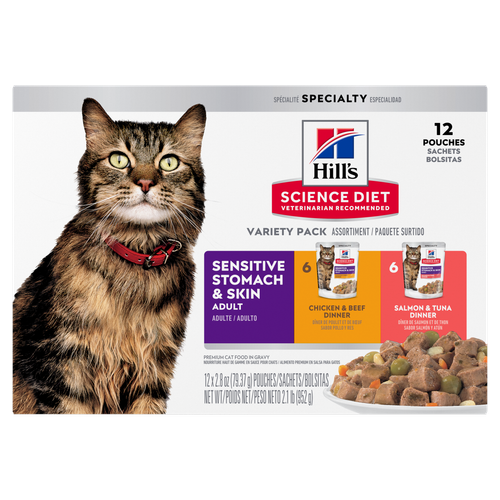
-
Find the right food for your petTake this quiz to see which food may be the best for your furry friend.Find the right food for your petTake this quiz to see which food may be the best for your furry friend.Health CategoryFeatured products
 Adult 6+ Large Breed Chicken Meal, Barley & Rice Recipe Dog Food
Adult 6+ Large Breed Chicken Meal, Barley & Rice Recipe Dog FoodSupports energy level, joint health, and beautiful coat in large breed mature dogs
Shop Now Puppy Sensitive Stomach & Skin Salmon & Vegetable Stew
Puppy Sensitive Stomach & Skin Salmon & Vegetable StewGentle on stomachs while nourishing skin & supporting development in growing puppies
Shop Now Adult Perfect Weight & Joint Support Chicken & Brown Rice Recipe Dog Food
Adult Perfect Weight & Joint Support Chicken & Brown Rice Recipe Dog FoodThis weight management and mobility support dog food was created with Hill’s unique understanding of the biology of overweight dogs.
Shop NowFeatured products Sensitive Stomach & Skin Chicken & Beef Dinner
Sensitive Stomach & Skin Chicken & Beef DinnerGourmet daily nutrition, carefully made. Tasty chunks with chicken & beef in a decadent gravy. Supports digestive health, nourishes skin and promotes a lustrous fur.
Shop Now Adult Sensitive Stomach & Skin Pouch Variety Pack Cat Food, Chicken & Beef, Salmon & Tuna
Adult Sensitive Stomach & Skin Pouch Variety Pack Cat Food, Chicken & Beef, Salmon & TunaCarefully made, gourmet daily nutrition. Tasty chunks with Salmon & Tuna in a decadent gravy. Supports digestive health, nourishes skin and promotes a lustrous fur.
Shop Now Adult Perfect Weight Salmon & Vegetable
Adult Perfect Weight Salmon & VegetableOver 70% of cats lost weight within 10 weeks when fed this nutrition
Shop Now -
DogCat
- Cat Tips & Articles
-
Health Category
- Weight
- Skin & Food Sensitivities
- Urinary
- Digestive
- Kidney
- Dental
- Serious Illness
-
Life Stage
- Kitten Nutrition
- Adult Nutrition
Featured articles The Right Diet For Your Pet
The Right Diet For Your PetLearn what to look for in healthy pet food & nutrition, including ingredients, quality of the manufacturer, your pet's age, and any special needs they have.
Read More Pet Food Storage Tips
Pet Food Storage TipsWhere you store your cat and dog food can make a big difference in the quality and freshness once it is opened. Here are some common questions and recommendations for optimal storage for all of Hill’s dry and canned cat and dog food.
Read More Water
WaterWater is the most important nutrient of all and essential for life. Animals can lose almost all their fat and half their protein and still survive, but if they lose 15% of their water, it will mean death.
Read More -


If you've ever noticed your dog limping or heard him whimpering or whining from obvious pain and discomfort, I'm sure you've asked the question, "What can I give my dog for pain?" You might have even been tempted to give your pooch relief with over-the-counter painkillers from your medicine cabinet. But is that a good idea? Keep reading to learn why giving your dog painkillers could only make things worse.
Q: Are over-the-counter pain medications safe to give my dog?
 A: In the vast majority of cases, the answer is no. Over-the-counter pain medications generally fall into two categories. The first category is non-steroidal anti-inflammatory drugs (NSAIDs), which include aspirin, ibuprofen and naproxen.
A: In the vast majority of cases, the answer is no. Over-the-counter pain medications generally fall into two categories. The first category is non-steroidal anti-inflammatory drugs (NSAIDs), which include aspirin, ibuprofen and naproxen.
The second is acetaminophen and is often included as an ingredient in cold and flu medicine.
NSAIDs work to reduce pain-causing inflammation by inhibiting an enzyme known as cyclooxygenase that is responsible for the production of inflammation-causing prostaglandins. However, prostaglandins are necessary in certain amounts for maintaining some important body functions, including proper blood flow to the kidneys and normal blood clotting. If too much prostaglandin production is inhibited, the effects on your dog's health could be devastating.
As for acetaminophen, which reduces pain without reducing inflammation, not a lot is known about exactly why it works. However, one thing is certain: it can cause damage to the liver and kidneys in dogs if ingested in toxic amounts.
Q: Why are these medications harmful to dogs?
A: There are a number of reasons why it can be unsafe to administer human pain medication to your dog. For one thing, it can be difficult to determine the correct dosage, and the risk of overdosing your dog is simply too great. Additionally, some dogs are more sensitive to NSAIDs, so even the correct dosage can cause them problems. The risk is intensified by other medications, such as corticosteroids, that your dog might be taking, as well as certain conditions, such as gastrointestinal problems or liver or kidney disease.


Tasty Tips
Q: What can happen if I give one of these types of medication to my dog?
A: If your dog accidentally overdoses on human pain medication or has a sensitivity to such medications, the results could include vomiting, diarrhea, bloody stool, appetite loss, kidney or liver damage or failure and even death.
Q: Is it safe to give my dog baby aspirin?
A: Low-dose aspirin, also known as baby aspirin, is an NSAID. Although the dosage is lower than full-dose aspirin, the risks remain. Aspirin, regardless of the dosage, could also have the effect of damaging your dog's stomach lining, resulting in ulcers or gastrointestinal issues.
Q: Are there any exceptions in which I should give aspirin to my dog?
A: In some cases, your veterinarian might advise you to give low-dose aspirin to your dog for pain. In such cases, you should carefully follow your vet's instructions, and only give the lowest effective dose over as short a period of time as possible, says Dogster. But aspirin should only ever be given to your dog under a veterinarian's direct supervision.
Q: What can I give my dog for pain?
A: While human pain medications should be used for humans only, there are several pain medications that are formulated specifically to help manage your dog's pain. Dog painkillers include carprofen, deracoxib, firocoxib and meloxicam, each of which can be prescribed by your vet.
Nobody wants to see their dog hurting, and the instinct to provide relief as quickly as possible can be hard to resist. But the best thing to do for your dog's pain is to call your vet, who can advise you on the best and safest method of relieving pain for your beloved pup.


Jean Marie Bauhaus is a pet parent, pet blogger, and novelist from Tulsa, Oklahoma, where she usually writes under the supervision of a lapful of fur babies.
Related products

Supports energy level, joint health, and beautiful coat in large breed mature dogs

Gentle on stomachs while nourishing skin & supporting development in growing puppies

This weight management and mobility support dog food was created with Hill’s unique understanding of the biology of overweight dogs.

Advanced nutrition shown to support joint health and improve mobility
Related articles

Though it may seem like your four-legged friend loves nothing more than to nap on the couch, dogs need regular exercise to stay healthy just like people do.

Selecting the right food for your puppy is a key to quality nutrition and a long, healthy life., Learn more about how to select the right puppy food.

A dog with a sensitive stomach has special needs. Learn more about sensitive stomach symptoms in your dog, what you can do to help sooth your pet’s insides and get recommendations on sensitive stomach dog food.

Learn what you can feed your pregnant or nursing dog to keep her and her new pups healthy.

Put your dog on a diet without them knowing
Our low calorie formula helps you control your dog's weight. It's packed with high-quality protein for building lean muscles, and made with purposeful ingredients for a flavorful, nutritious meal. Clinically proven antioxidants, Vitamin C+E, help promote a healthy immune system.
Put your dog on a diet without them knowing
Our low calorie formula helps you control your dog's weight. It's packed with high-quality protein for building lean muscles, and made with purposeful ingredients for a flavorful, nutritious meal. Clinically proven antioxidants, Vitamin C+E, help promote a healthy immune system.

